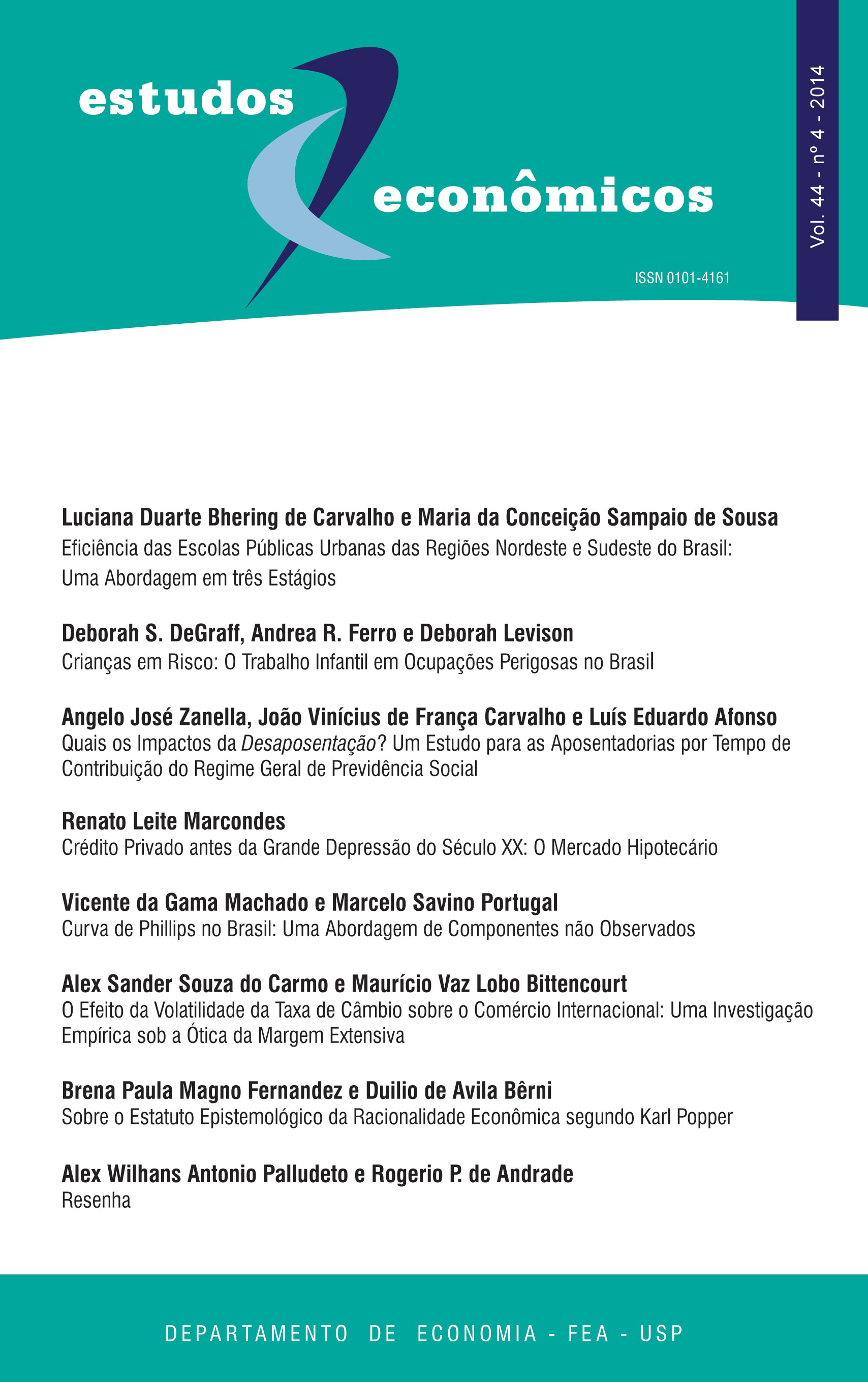Quais os impactos da desaposentação? Um estudo para as aposentadorias por tempo de contribuição do Regime Geral de Previdência Social
DOI:
https://doi.org/10.1590/S0101-41612014000400003Keywords:
Social security, Re-retirement, Actuarial fairnessAbstract
This study aims to evaluate the impacts of re-retirement, a term used when an Brazilian
insured INSS retires, but remains in the formal labor market, and asks recalculation of
the pension benefit due to the increase in the contribution period. There is an important
tradeoff: the more the insured take to ask re-retirement, the greater the increase
in the value of the benefit. However, the time of enjoyment of this gain will be less.
Conversely, the more premature re-retirement, the lower the effective increase in the period and greater enjoyment. The theoretical framework is based on the concepts
of actuarial justice and actuarial neutrality. Were employed four indicators used in the
literature pension: Replacement Rate, Internal Rate of Return, Necessary Rate and
Effective Rate. The results show an optimal period for re-retirement: at least 4.83
years (men) and 7.83 years for (women). If the return of the benefit is required before
the recalculation, there is no advantage in re-retirement.
Downloads
References
AFONSO, L. E.; FERNANDES, R. Uma estimativa dos aspectos distributivos da previdência social no Brasil, Revista Brasileira de Economia, v. 59, n. 3, p. 295-334, 2005.
BRASIL. Constituição (1988). Constituição da República Federativa do Brasil. Brasília, DF: Senado, 1988.
BRASIL. Decreto 3.265, de 29 de novembro de 1999, Altera o Regulamento da Previdência Social, aprovado pelo Decreto nº 3.048, de 6 de maio de 1999, e dá outras providências. Diário Oficial [da] República Federativa do Brasil, Poder Executivo, Brasília, DF, 30 nov. 1999.
BRASIL. Decreto 3.048, de 06 de maio de 1999, Aprova o Regulamento da Previdência Social, e
dá outras providências. Diário Oficial [da] República Federativa do Brasil, Poder Executivo,
Brasília, DF, 07 mai. 1999.
BRASIL. Decreto nº 6.208 de 18 de setembro de 2007, Dá nova redação ao parágrafo único do art. 181-B do Regulamento da Previdência Social, aprovado pelo Decreto no 3.048, de 6 de maio de 1999. Diário Oficial da República Federativa do Brasil, Brasília, DF, 19 de setembro de 2007.
BREYER, F.; KIFMANN, M. Incentives to retire later – a solution to the social security crisis? Journal of Pension Economics and Finance, v. 1, n. 2, p. 111-130, 2002.
BROWN, J. R.; WILCOX, D. W. Discounting State and Local Pension Liabilities. American Economic Review, v. 99, n. 2, p. 538–542, 2009.
CAETANO, M. A. R. Subsídios cruzados na previdência social brasileira. Brasília: Ipea, 2006. (Texto para discussão, 1211).
COMPRIX, J.; MULLER, K. A. Pension plan accounting estimates and the freezing of defined benefit pension plans. Journal of Accounting and Economics, v. 51, n. 1-2, p. 115.
FISHER, W. H.; KEUSCHNIGG, C. Pension reform and labor market incentives. Journal of Population Economics, v. 23, n. 2, p. 769-803, 2010.
FORTEZA, A.; OURENS, G. Redistribution, insurance and incentives to work in Latin American pension programs. Journal of Pension Economics and Finance, v. 11, n. 3, p 1-28, 2012.
FORTEZA, A.; OURENS, G. How much do Latin American pension programs promise to pay back? SP Discussion Paper, n. 0927, World Bank, 2009.
GIAMBIAGI, F; AFONSO, L. E. Cálculo da alíquota de contribuição previdenciária atuarialmente
equilibrada: uma aplicação ao caso brasileiro. Revista Brasileira de Economia, v. 63, n. 2, p.
-179, 2009.
GUSTMAN, A. L.; STEINMEIER, T. L.; TABATABAI, N. Redistribution under the Social Security
benefit formula at the individual and household levels, 1992 and 2004. Journal of Pension Economics and Finance, v. 12, n. 01, p. 1–27, 2012.
HASSLER, J.; LINDBECK, A. Optimal actuarial fairness in pension systems: a note. Economics Letters, v. 55, n. 2, p. 251-255, 1996.
IBRAHIM, F..Z. Desaposentação o Caminho Para Uma Melhor Aposentadoria. 5ª Ed. Niteroi: Impetus, 2011
QUEISSER, M; WHITEHOUSE, E. Neutral or fair: actuarial concepts and pension-system design.
OECD Social, Employment and Migr. Working Paper n. 40, 2006.
REZNIK, G. L.; WEAVER, D. A.; BIGGS, A. G. Social security and marginal returns to work near
retirement. Social Security Issue Paper n. 2009-02, 2009.
SHOVEN, J. B.; SLAVOV, S. N. The decision to delay social security benefits: theory and evidence. NBER Working Paper Nº 17866, February, 2012a.
SHOVEN, J. B.; SLAVOV, S. N. When does it pay to delay social security? The impact of mortality,
interest rates, and program rules. NBER Working Paper Nº 18210, July, 2012b.
SCHRÖDER, C. Profitability of pension contributions – evidence from real-life employment biographies. Journal of Pension Economics and Finance, v. 11, n. 3, p. 311-336, 2012.
VAN DUIJN, M.; MASTROGIACOMO, M.; LINDEBOOM, M.; LUNDBORG, P. Expected and actual
replacement rates in the pension system of the Netherlands: how and why do they differ? Journal of Pension Economics and Finance, v. 12, n. 02, p. 168–189, 2013.
Downloads
Published
Issue
Section
License
Copyright (c) 2014 Angelo José Zanella, João Vinícius França Carvalho, Luís Eduardo Afonso

This work is licensed under a Creative Commons Attribution-NonCommercial 4.0 International License.
By submitting an article, the author authorizes its publication and attests that it has not been submitted to any other journal. The original article is considered final. Articles selected for publication are proofread for grammatical and orthographic errors. The journal does not pay rights for published articles. The Institute of Economic Research from the School of Economics, Business and Accounting of the University of São Paulo (Instituto de Pesquisas Econômicas da Faculdade de Economia, Administração e Contabilidade da Universidade de São Paulo) owns the journal's copyright.





 Atualizado em 14/08/2025
Atualizado em 14/08/2025